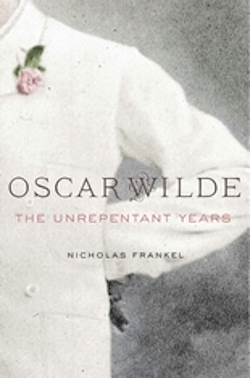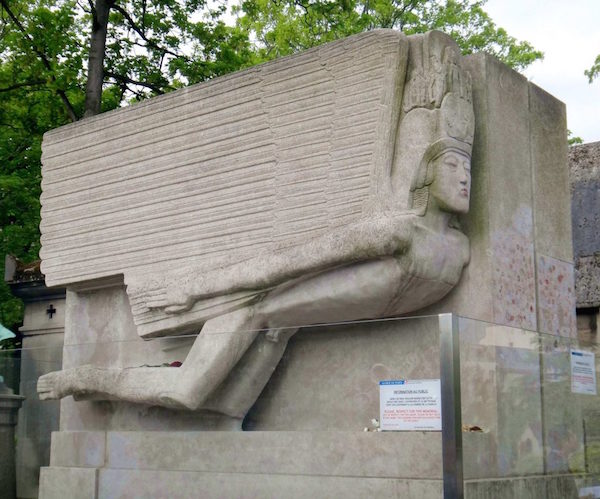Book Review: Oscar Wilde Fights the Dying of the Light
Oscar Wilde’s life might have been tortured but, according to Nicholas Frankel in this splendid look at the writer’s final years, he never believed he had been disgraced, only rejected.
Oscar Wilde: The Unrepentant Years by Nicholas Frankel. Harvard University Press, 374 pages, $29.95.
By Thomas Filbin

The rise and fall of Oscar Wilde’s life is almost too well known: poet, rising star of the London theater, scandal, sensational trial, imprisonment, exile, and death at the age 46. But that potted version ignores — for the sake of a neat narrative about martyrdom — so much as to be not merely defective, but downright erroneous. In his new biographical study, Nicholas Frankel has written of Wilde’s last years with an illuminating eye, exploring how his release from prison in 1897 and death in Paris in 1900 was the final act in a startling drama: this is the portrait of a man who, through hardship, finally became himself.
Frankel’s story begins with Wilde’s prison term, a two-year sentence at hard labor for ‘gross indecency.’ At the time, the petty indignities and cruelties of imprisonment were beginning to disturb Victorian consciences. Hard labor meant walking on a treadmill for a good part of the day, eating bad food, and (barely) sleeping on a hard plank bed. Critics noted that even for a working man the physical demands of jail were harsh — for a man of refinement like Wilde it was tantamount to a death sentence. He lost weight, could not eat the vile rations, and toward the end of his sentence collapsed to the floor due to weakness. He injured his ear, which caused deafness and most likely predisposed him to the meningoencephalitis which later led to his death.
Wilde wrote a letter cataloguing the inhumanity of incarceration and concluded with political finality, “It is not the prisoners who need reformation, it is the prisons.”
When he was released most of his friends and admirers turned their backs on him, but a few disregarded social stigma and helped him. Ada Leverson took him in before he went to France, where he chose to live under an assumed name, Sebastian Melmoth. A wealthy Canadian, Robert Ross, once a lover and now a friend forever, got him set up in Paris. Reggie Turner, Robert Sherard, and the notorious Frank Harris extended comfort and money. They also aided in the publication of Wilde’s poem “The Ballad of Reading Gaol.” Its publisher, Leonard Smithers, a former lawyer whose interests ran to the Decadents and erotica, was described as “the most learned erotomaniac in Europe.” He went bankrupt not long after the volume’s publication, dying destitute at the age 46 of drugs and drink.
Upon Wilde’s release from prison, his friend (dissolute poet) Ernest Dowson tried to interest him in having sex with women and took him to brothel. “It was like chewing cold mutton,” Wilde is supposed to have observed, “…but tell it in England, where it will entirely restore my reputation.”
After prison, Wilde’s relations with his lover Lord Alfred Douglas went from cold to hot and back again several times. Douglas initially repudiated his time with Wilde, but then reunited with him. They traveled together: one charming picture in the book — of the two in Naples in the autumn of 1897, elegant in jackets, ties, and boaters — suggests their long and complex relationship. In Rome, Oscar went to papal audiences repeatedly, a foreshadowing of his eventual deathbed conversion to Catholicism.
The Italian respite was soon to end, however, because the English expat community shunned Wilde and Douglas. Wilde’s wife Constance and Douglas’ mother threatened to cut off funds if the pair dared to remain together. Constance, who referred to Douglas as “that appalling individual,” was shocked that Wilde had taken up with him again, a violation of the terms which dictated her allotment of his allowance. Wilde wrote in a letter that the result of her refusal to support him was “…to leave me to die of starvation or to blow my brains out in a Naples urinal… Moral people, as they are termed, are simply beasts. I would sooner have fifty unnatural vices than one unnatural virtue. It is unnatural virtue that makes the world, for those who suffer, such a premature Hell.”
Wilde returned to Paris and spent his last year in a hotel on the Left Bank. His hotelier, Dupoirier, was a model of ‘unnatural’ kindness, carrying the bill on credit, recovering some of the writer’s clothes (which been held for non-payment at his previous lodging), washing and dressing Wilde’s corpse, and even providing a funeral wreath of cheap beads with the words “A mon locataire” (to my tenant).

Oscar Wilde’s tomb in Père Lachaise Cemetery, Paris, France. It took nine to ten months to complete by the sculptor Jacob Epstein, with an accompanying plinth by Charles Holden and an inscription carved by Joseph Cribb.
Wilde drank heavily during that period and looked much older than his 46 years. He lived to see the great Exposition of 1900, touring the fair many times. He was sexually active then, as he had been through much of his post-prison life, and was unapologetic about it. He would walk the streets and boulevards, sometimes meeting English speaking people in a bar or restaurant, get himself invited to sit with them without saying who he was, and regale them of stories of his old days, nights at the theater, dinners at the Cafe Royal with all of society, even meeting the Prince of Wales. When he had talked enough Wilde bid them a good evening and made his exit — leaving his hosts with the bill.
Invariably someone at the table would, in baffled wonderment at the stories, ask, “Who WAS that man?” With a sly smile, someone in the know would softly say, “That was Oscar Wilde.”
Frankel is a gifted writer who has taken the facts of Wilde’s final years and transformed them into a compelling exploration of the figure’s heroism. His research into the letters and recollections of those who knew Wilde is exhaustive and impressive, but he resists pedantic dissection — he wisely focuses on what Wilde made of his suffering, how he maintained an admirable strength, a commitment to himself and his sexuality, in the face of injustice. Wilde’s last years were sad in many ways, but more so in the eyes of conventional beholders, who wanted to see a broken man, a pathetic monument to miscalculation. In Wilde’s mind, he had finally perfected the art of living — being Oscar was both his calling and his reward. Wilde’s life, Frankel insists, although tortured, never left him believing he had been disgraced — only rejected.
Even in death, controversy continued; the fine sculpted tomb at Pere Lachaise by Jacob Epstein shocked both the British and the French because the monument’s sphinx-like creature had genitalia: it was, by Victorian standards, obscene. The tomb was vandalized, then covered with a tarpaulin, and finally exhibited. Defacement was not only the result of scorn; Oscar’s admirers adorned the stature with loving graffiti and lipstick kisses. Finally, the monument was cleaned and encased in glass, which itself has became (see above) the canvas upon which people could express their affection for him.
Time passes, but Oscar is forever.
Thomas Filbin has reviewed books for newspapers, magazines, and academic journals.
Tagged: Harvard University Press, Nicholas Frankel, Oscar Wilde, Oscar Wilde: The Unrepentant Years

I have read some of Frankel’s volume and concur with Tom’s recommendation — this is a moving, perceptive, and eye-opening look at the final years of Wilde’s life. It paints a far more complex and yes, heroic, portrait of Wilde’s final period than earlier narratives, which dwelled, with a bit too much moralistic enthusiasm, on his degradation and weakness. (Playing up the “poor Oscar” syndrome.) There was far more going on during this period, a proud sense of (stoic) victory was well as an acceptance of defeat. Here is Wilde — sounding magnificent — a year before his death:
Great to hear that the divine Oscar didn’t let the bastards get him down.